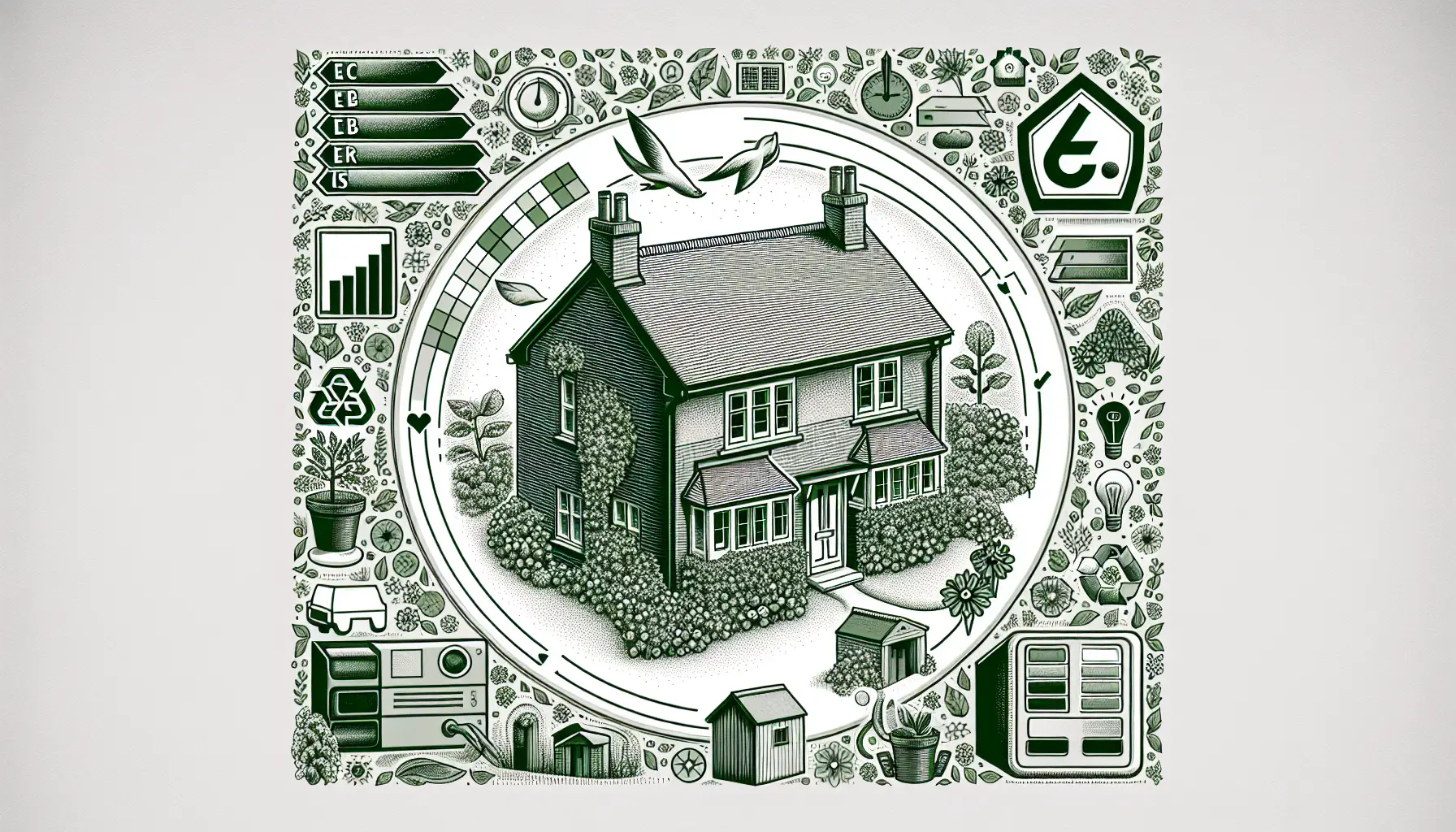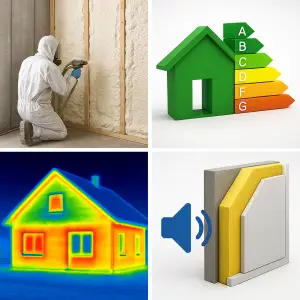What Is a SAP Assessment and Why Should You Care?
SAP stands for Standard Assessment Procedure. It’s a way to work out how energy-efficient a house in the UK is. If you’ve ever seen or heard of an EPC, or Energy Performance Certificate, that’s the result of a SAP calculation.
We often get asked by homeowners, “What exactly does this mean for my home?” It’s simple. A SAP assessment UK checks how well your home uses energy. It considers things such as your heating system, hot water, insulation, lighting and ventilation. Based on this, your house is given a rating between 1 and 100+. The higher the number, the better.
Getting this right matters. A low SAP rating could mean your home loses energy quickly and, as a result, costs more to run. A high rating tells you a home is warmer, more comfortable and cheaper to live in.
Using a trusted provider like Ratio Seven makes sure your SAP assessment is done according to current rules and in a way that helps you boost your home’s performance.
When Do You Need a SAP Assessment?
You might need a SAP assessment more times than you’d think. Nearly all new build homes in the UK need one before they can be sold or rented. If you’re extending your property or converting an old barn into a dream house, you’ll also need a SAP calculation.
Developers and self-builders use these reports to show local councils that a property follows Building Regulations Part L, which relates to energy use and carbon output.
If you’re trying to meet energy rules and get building approval, a SAP assessment helps you tick that box. But it’s not just for paperwork. It also shows areas where your home could perform better, whether it’s upgrading windows or switching the boiler.
At Ratio Seven, we’ve helped countless homeowners with this step. Whether you’re designing your layout or just about to fit the roof, we can give sound advice and carry out the full SAP assessment process.
What Does the SAP Process Involve?
The process is more straightforward than most people expect. It usually begins with house plans. These include floor layouts, wall details, heating choices and insulation materials. If you’re building from scratch or making big changes, you’ll need these ready for the SAP experts.
Once the plans are supplied, SAP assessors use software to build a digital version of your house. They then run this model through a set system which checks how energy flows through your home. The result is your SAP rating and your EPC.
A pre-construction SAP report helps identify heat loss, suggests better insulation or tweaks to your heating system and may even help you avoid fines for non-compliance.
At Ratio Seven, we not only handle your SAP assessment but also explain each part clearly so you can make better choices. Whether your project is large or small, having our guidance early can prevent bumps later on.
What Affects Your SAP Rating?
A SAP rating depends on several parts of your home, and each one can pull the figure up or down. Some key parts include:
- Heating system: Gas boilers with high energy ratings score better. Electric or air-source heat pumps can also help.
- Insulation: Well-insulated floors, roofs, and walls keep heat inside, which improves your rating.
- Windows and Doors: Double glazing (or even triple glazing) reduces drafts and raises energy scores.
- Lights and Ventilation: LED lights and proper airflow systems are supported by SAP rules as ways to cut energy waste.
Even small bits like how you heat water or where the sun hits your home make a difference. SAP assessors consider all of these during the review. By making just a few upgrades, you could jump two or three bands on your EPC.
We’ve worked with homes where changing just the lighting setup has kicked their rating up a full letter grade. Simple changes can often have big results.

What Will the SAP Report Tell You?
When the assessment is done, you’ll get a document that includes the following:
- An EPC energy rating between A (best) to G (worst)
- An environmental rating based on carbon dioxide output
- Expected energy use in kilowatt-hours per year
- Suggestions for improving energy use and savings
This isn’t just a long list of numbers. It shows how much your home will cost to heat, light and supply with hot water. It may even suggest how adding solar panels or changing the boiler could cut those costs.
Builders often use this report as a checklist during construction. Residents can use it to plan upgrades over time. Either way, it gives you useful data to work with.
At Ratio Seven, we prepare the results in a clear way so you don’t feel lost in jargon. You’ll understand which changes bring the most gains and where your money is best spent.
Why Homeowners Should Take SAP Seriously
Many homeowners think of SAP as a step only developers worry about, but that’s not true. If you ever plan to sell or rent your home, your EPC rating becomes public. This affects the value, appeal and even legal side of the process.
A home with a better rating is more likely to stand out on the housing market and draw in buyers. Let’s say your house rates a D, and a similar house down the street comes in at B. Guess which one will attract more attention?
Also, from 2025, landlords will need a minimum EPC rating of C if they want to rent their homes. If your rates are below that, you’ll need to make changes or face fines. Having an up-to-date SAP assessment helps plan for this rather than rush later.
We’re helping more homeowners now than ever before, as people start to see the real benefits of a solid SAP score. Property values rise, running costs drop, and there are fewer surprises along the way.
How SAP Supports Greener Living
The SAP system plays a role in the UK’s wider goals for reducing carbon impact. Scoring houses fairly and putting a number on energy use helps people make smarter decisions.
If we all live in homes that waste less heat and use cleaner fuels, we reduce the pressure on the planet. That doesn’t mean turning your home into a passive house, but each change helps.
A SAP assessment doesn’t tell you to rip everything out. Instead, it gives you a roadmap. Change your insulation, switch to an electric boiler, choose low-flow taps or add solar panels. Each step is one closer to a lower bill and a lighter footprint.
We at Ratio Seven believe this is where real progress starts. Not from promises, but from informed changes backed by smart data. That’s what SAP offers.
Your Questions Answered
Do I need a SAP assessment for an extension?
Yes. If you’re adding a large glazed area or increasing your house’s volume, you’ll likely need a SAP calculation to meet Building Regulations.
Is a SAP assessment the same as an EPC?
Not quite. A SAP calculation is used to produce an EPC, but the two are linked. Think of the SAP as the engine that powers the EPC.
Can I improve a poor SAP score?
Yes. You can boost ratings by improving insulation, installing better heating or even changing energy suppliers.
How long does the assessment take?
Once we receive full plans and details, most assessments are prepared within a week. We always aim to work with your schedule.
What’s the cost?
This depends on how complex your project is. New builds and major renovations need more input than a small home extension. We offer clear quotes with zero surprises.
Let’s Get Your SAP Sorted
The best time to think about your SAP rating is before work starts. Doing this early helps avoid setbacks, lowers your energy bills and makes passing building checks far easier.
If you’re starting a self-build, adding an extension or buying a fix-up project, we can guide you through it from start to finish. Our team at Ratio Seven will make sure your home ticks all the boxes, works better for you and stands strong for years to come.
We’re here to help you get it sorted. Give us a call or get in touch today and let’s chat about your project. The right result starts with a smart first step.




